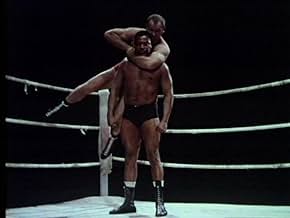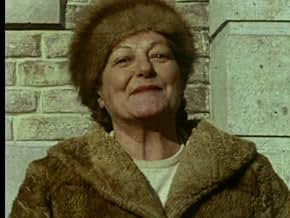Ajouter une intrigue dans votre langueSpike Milligan's groundbreaking yet largely unknown surreal comedy sketch series that inspired Monty Python's Flying Circus.Spike Milligan's groundbreaking yet largely unknown surreal comedy sketch series that inspired Monty Python's Flying Circus.Spike Milligan's groundbreaking yet largely unknown surreal comedy sketch series that inspired Monty Python's Flying Circus.
- Nomination aux 1 BAFTA Award
- 1 nomination au total
Parcourir les épisodes
Avis à la une
The line between genius and madness is a fine one, and no individual epitomised these extremes more effectively than Spike Milligan. The 'Monty Python' team freely admit drawing inspiration from his shows. I never saw 'Q5' alas, but the later series - beginning with 'Q6' - were a mixture of the brilliant and banal. Like the Pythons, if Milligan tired of a sketch he'd cut it short. False noses and boot polished faces cropped up a lot. Then there was the well-endowed Julia Breck, whom Spike delighted in undressing on air. Spike himself never seemed to be able to get through a sketch without giggling. Amongst the highlights were a spoof 'The World About Us' about the 'Cock-a-knees' ( Cockneys ), the 'Good Samaritan' read from a pulpit by a police officer, the infamous Pakistani Dalek sketch, 'The First Irishman In Space', 'The Smallest Police Station In The World' and Adolf Hitler doing a George Formby impression. You had to love Spike to love the show - and I did.
One bloke says it's good, the other says it's crap.
Me? I say some bits are good and some bits are crap.
If you find Milligan's personality attractive then you will be able to let him take you on a ride through his imagination. Lots of Hitlers of course and coppers with flashing lights on their helmets (helmets like these were actually tested by the Coventry force in the 1960s!). Semi naked tarts and swarthy foreigners will do little to endear the show to the PC brigade and some of the material does rely on Spike cracking up for it's laughs but it still has a higher 'hit-rate' than Monty Python.
The 'Pakistani Daleks' sketch is something of a classic and it might even have a bit of a message if you consider Milligan's Indian upbringing.
Finally, if you see the video 'The Best Of Q' I advise you to snap it up. It's very good value and it gives a good idea of what the show is about. It contains some of the very best sketches and now Spike's conked out it might be hard to find in years to come.
Me? I say some bits are good and some bits are crap.
If you find Milligan's personality attractive then you will be able to let him take you on a ride through his imagination. Lots of Hitlers of course and coppers with flashing lights on their helmets (helmets like these were actually tested by the Coventry force in the 1960s!). Semi naked tarts and swarthy foreigners will do little to endear the show to the PC brigade and some of the material does rely on Spike cracking up for it's laughs but it still has a higher 'hit-rate' than Monty Python.
The 'Pakistani Daleks' sketch is something of a classic and it might even have a bit of a message if you consider Milligan's Indian upbringing.
Finally, if you see the video 'The Best Of Q' I advise you to snap it up. It's very good value and it gives a good idea of what the show is about. It contains some of the very best sketches and now Spike's conked out it might be hard to find in years to come.
Anyone who has ever read books on Monty Python will no doubt have noticed that the Pythons themselves credit this particular series as being their inspiration. Its first 7 episodes screened several months before Monty Python's first series. The influence is apparent. Spike had the same surreal and mad atmosphere, often showing deconstructed skits (ie. one with no props, with an on-screen title saying "BBC economy sketch". However, it has to be said that Milligan has a more visual humour than Python, he would never have produced 'The Argument Clinic' or 'The Cheese Shop.' There was a lot of profanity, risque jokes and sending up of the Royal Family, which no doubt explains why most of the series was never repeated. The quality of the comedy also varied a lot, some skits were so abstract that they were probably closer to Luis Bunuel than Monty Python: a sketch would just stop in the middle and the characters would walk about the stage, bumping into each other like robots. The costumes are always strange, and the characters often wear large plastic noses a la Raymond Luxury-Yacht from Monty Python. The later series have some hilariously funny scenes eg. a traffic cop asks to see a flying carpet driver's licence and is given a banana, or a Dolly Parton look-alike whose breasts double as bagpipes. There's also a lot of Goon Show references (Spike's Minnie Bannister voice). If you're a fan of the strangest of British humour, this is definitely worth a look, but be warned it is quite hard to find. The BBC recently showed a few episodes, and there's a 'best of' compilation available called 'Spike Milligan in the Best of Q'
I saw these programmes when originally transmitted. I have brought the box set to reaquaint myself with them.Sometimes he is funny,other times he is boring.At all times he is racist. Black people are called wogs. An old fashioned cash register is called a Jewish piano. Not ok then and certainly not now.
Spike Milligan's "Q" series was certainly ground-breaking. His Goon Show on radio, more than a decade earlier, was very innovate, extremely funny (except for some patches where Spike was stressed and lacked the support in writing or production that he needed), and suitable for all the family (well, the bits that weren't were w-a-y over the heads of the kiddies). But Q5 went further - further than Goon Shows, further than other other television comedy anywhere in the world at that time, and further even than Monty Python in pure silliness. As a result, it went nowhere nearly as far in wide appeal nor, it has to be said, in fun. But not all comedy is fun or funny or pleasant. Spike knows black, absurd comedy, and being pleasant is not what it's about.
One gift Spike had was to see life as it is, and not just ask "why are people like that?" and poke fun at them - as satire does - but to imagine what life would be like with some changes. Often those changes involve people acting or talking the way we might find ourselves thinking at times - we laugh at the outlandish scenarios, but we are really laughing at our innermost thoughts and reaffirming life the way it is, the civilized way we choose to maintain it. Sometimes the story involves something so "wrong", like the idea of a Dalek married, coming home from work, and we must extend our minds long enough to think about the possibilities, setting aside the incongruities, until we again find ourselves laughing at what is wrong with the idea, and subconsciously understanding normal married life (and curries) a little more.
Q isn't always rude, but it sometimes is; be warned. Like some other comedians who use crudity, it can seem that (for example) racist comments, or denigration of women is promoted by the scripts; rather the opposite is true: those who do this are ridiculed, but it remains an unpleasant experience on many counts, for many types of viewer. Although funny in many places, this is primarily art, and a form where the viewer may suffer for the art more than the artist.
One gift Spike had was to see life as it is, and not just ask "why are people like that?" and poke fun at them - as satire does - but to imagine what life would be like with some changes. Often those changes involve people acting or talking the way we might find ourselves thinking at times - we laugh at the outlandish scenarios, but we are really laughing at our innermost thoughts and reaffirming life the way it is, the civilized way we choose to maintain it. Sometimes the story involves something so "wrong", like the idea of a Dalek married, coming home from work, and we must extend our minds long enough to think about the possibilities, setting aside the incongruities, until we again find ourselves laughing at what is wrong with the idea, and subconsciously understanding normal married life (and curries) a little more.
Q isn't always rude, but it sometimes is; be warned. Like some other comedians who use crudity, it can seem that (for example) racist comments, or denigration of women is promoted by the scripts; rather the opposite is true: those who do this are ridiculed, but it remains an unpleasant experience on many counts, for many types of viewer. Although funny in many places, this is primarily art, and a form where the viewer may suffer for the art more than the artist.
Le saviez-vous
Meilleurs choix
Connectez-vous pour évaluer et suivre la liste de favoris afin de recevoir des recommandations personnalisées
Détails
Contribuer à cette page
Suggérer une modification ou ajouter du contenu manquant
























